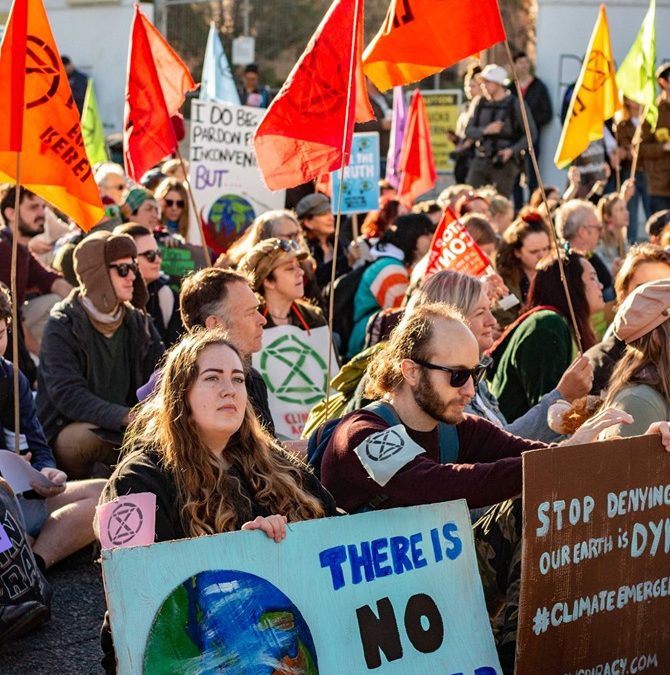I’ve always been one of those people (you know, the artists, religious believers and flat-earthers) who believes not everything can be explained by science. Science is good for understanding the mechanics of how things work, but not necessarily why we should care how they work. Scientific studies are rarely unburdened by the individual biases and influences of the scientist, and a “scientific worldview” carries its own preconceptions.
Like any ideology, it can be used to avoid debate and blind us to other possibilities (“it’s simple science!”), and can be frustratingly conservative, like when evolutionary psychologists give answers to explain why we act in certain ways with no acknowledgement of the very human (evolutionary) urge to explore and progress.

In recent years, in the struggle to stop catastrophic climate change, one of the repeated catchcries has been to “listen to science” and its studies of climate impacts. Like some kind of medieval rerun, the story is told of scientific good guys progressing our society and rescuing us from the dark ages of climate-denying politicians – for an example see the “March for Science” political protests that have been held since the inauguration of Donald Trump.
The scientific study of atmospheric carbon dioxide levels tells us part of the story of why climate change is happening – but only part of the story. Because if human beings acted as purely rational animals observable in a petrie dish, we would have already made drastic changes to our carbon-intensive lifestyles for the sake of our own future – the drive for self-perpetuation that is supposedly a characteristic of all life.
To really understand why human-caused climate breakdown is occurring means grappling with some mysterious unseen forces – power, greed, fear, pride, parochialism, propaganda, apathy.
It’s easy to see why the mining industry goes to immense effort to hinder climate action, but there’s nothing inherently rational about greed, especially the quest for digits in our bank balance that come at the expense of the conditions actually required for a healthy life. And how do you explain Joe Blow, who has nothing really to gain from continued carbon emissions yet sits on his computer all day trolling environmentalist groups with dubious arguments about “the climate myth”?
Amongst those trying to stop the climate crisis, there is a tendency to think that science is the thing that will get us there. Studies are routinely commissioned, new reports constantly published. Scientists of all kinds are developing ideas to combat climate change, from renewable electricity to bio-engineering and plenty of things in between.
There’s also a kind of social science used to try to stop climate change – the science of campaigning/movement building. It’s a broad field this one; from the study of key powerbrokers for lobbying, to which links in the chain are most susceptible to protest action. From the science of social media traction and effective fundraising, to the logistics of relationships. “The most important tool you have is your story” says a big environmental organisation, so they teach you a template for weaving the tale of how you got woke to climate change into any conversation.
Even Extinction Rebellion, which would seem to be a long way from this kind of thinking, has a kind of hypothesis underlying its methodology – the movement quotes Erica Chenoweth’s statistic that 3.5% of the population protesting will lead to social change as if it’s one of Newton’s three laws of motion.
All these things contain elements of wisdom that can help, but ultimately social change is not easily reduced to scientific theory. Like understanding why it is happening, trying to stop climate change will require engaging with some of the mystical and unseen realms.
We need philosophers who can help us grapple with the existential crisis of a human-caused phenomenon that is inextricably tied to our health and wellbeing yet threatens our very existence.
We need artists to illuminate, to provoke and to help us to imagine new possibilities. The “cli-fi” authors that engage us in a world beyond our here and now, the nature photographers who can depict the effects of climate change and reveal the beautiful and fragile ecosystems we are threatening. The songwriters who call us to action, the conceptualists who encourage us to look at ourselves and our world in new ways.
We need activists, whose acts of courage and creativity inspire others to insert themselves as active players in the political process, whose willingness to confront power brings to the surface the tensions that stop us taking effective climate action.
We need relationships that go beyond the self-interested exploitation that when expanded to a broad scale has truly disastrous consequences. Acts of love and care that show the possibilities of lives lived in pursuit of mutual aid not selfish gain. We need empathy and understanding of those who think differently, forgiveness to deal with the complicity of us all in this crisis, integrity to inspire us to more and hold us accountable to doing better.
We need all this and more. More things I haven’t listed here because I’m limited by my own perspective, more things that no one has even thought of yet.
Understanding the world we live in requires a bit of observation and a bit of imagination. A bit of science and a bit of magic. Changing the world will require the same.
– Andy Paine


Recent Comments